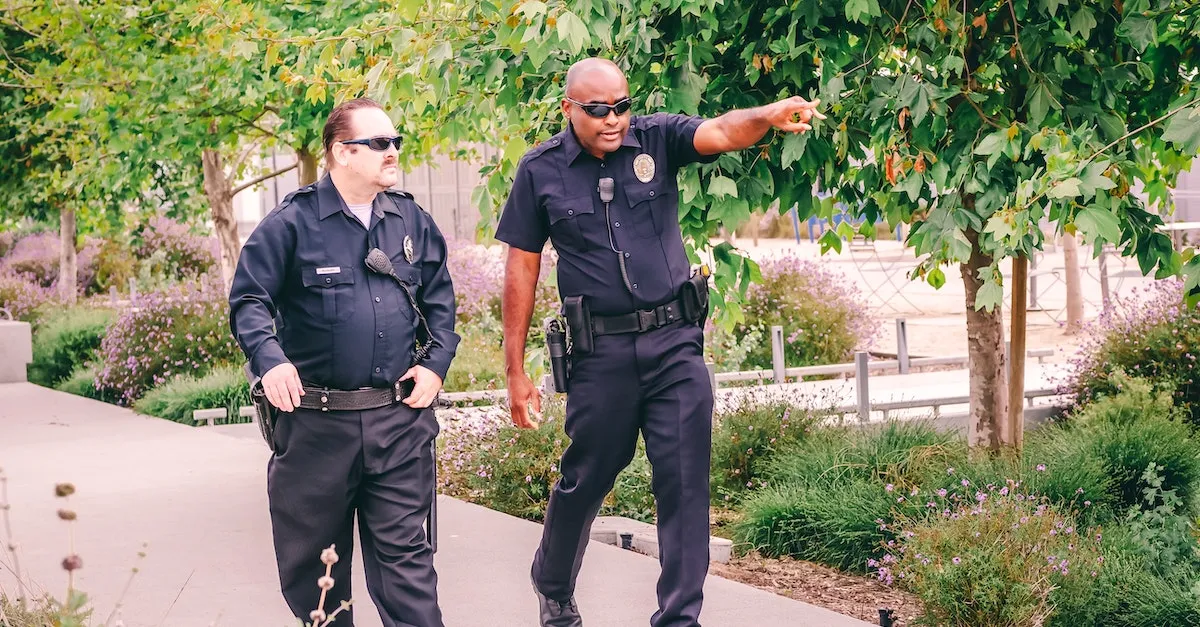Can Police Come On Your Property Without Permission In Florida?
Having police officers enter your property uninvited and without a warrant can be alarming. You may be wondering what your rights are and if Florida police can legally access your property whenever they want. The quick answer is, in most cases, no. Police need either permission or probable cause to lawfully enter private property.
In this comprehensive guide, we’ll cover when Florida police can and cannot enter your property without a warrant. You’ll learn about the exceptions to the warrant requirement, what constitutes probable cause, and steps to take if officers trespass on your land illegally.
Homes and Fenced-In Areas
When it comes to the privacy of your home and fenced-in areas, the law in Florida provides certain protections. Law enforcement officers typically cannot enter your home or fenced-in areas without permission or a warrant, except under certain circumstances.
Warrant Required for Homes
In Florida, the Fourth Amendment of the United States Constitution protects individuals from unreasonable searches and seizures. This means that law enforcement officers generally need a warrant to enter your home, unless there is a valid exception to the warrant requirement.
Exceptions to the warrant requirement include situations where there is consent from someone who has authority over the property, or if the officers have a reasonable belief that an emergency situation exists, such as the need to prevent imminent harm to someone or the public.
It is important to note that even if law enforcement officers have a warrant to search your home, they must still follow certain guidelines and limitations outlined in the warrant. If they exceed the scope of the warrant, any evidence obtained may be deemed inadmissible in court.
Fenced Areas Considered Private
In Florida, fenced areas are generally considered private property. This means that law enforcement officers cannot enter your fenced-in areas without permission or a warrant, unless there is a valid exception to the warrant requirement.
It is worth mentioning that there are some exceptions to this general rule. For example, if law enforcement officers have a legitimate reason to believe that a crime is being committed or that there is an immediate threat to public safety, they may be able to enter fenced areas without a warrant.
However, it is important to consult with a legal professional to fully understand your rights and the specific circumstances under which law enforcement officers can enter your property without permission.
For more information on your rights regarding law enforcement entering your property without permission in Florida, you can visit the Florida Bar website or consult with a qualified attorney.
Open Fields and Plain View
In Florida, there are certain circumstances in which the police can come onto your property without obtaining your permission. Two important legal concepts that grant police this authority are the “open fields” doctrine and the “plain view” doctrine.
No Expectation of Privacy
Under the open fields doctrine, law enforcement officials are permitted to enter and search areas of your property that are considered to be “open fields.” These are typically areas that are not enclosed or protected by a reasonable expectation of privacy, such as open fields, wooded areas, or undeveloped land.
It’s important to note that the open fields doctrine does not apply to areas that are within the curtilage of your home, which includes the area immediately surrounding your house, such as your backyard.
The curtilage is generally considered to be an extension of your home and is protected by a higher expectation of privacy.
However, if the police have a valid search warrant or probable cause to believe that a crime is being committed, they may be able to enter the curtilage of your home without your permission.
Plain View Doctrine
The plain view doctrine allows law enforcement officers to seize evidence or contraband that is clearly visible to them when they are lawfully present in an area. If an officer is legally on your property and sees illegal items or evidence of a crime in plain view, they can seize it without obtaining a warrant.
For example, if an officer is responding to a noise complaint and sees drugs on a table through a window, they can seize the drugs as evidence. Similarly, if an officer is in your backyard investigating a separate incident and sees a stolen bicycle, they can confiscate it without a warrant.
In order for the plain view doctrine to apply, the following conditions must be met:
- The officer must have a lawful right to be in the location where the item is observed.
- The item must be immediately apparent as evidence or contraband.
- The officer must have a lawful right of access to the item.
It’s important to understand that while the police have certain powers to enter your property without permission under these doctrines, they still need to abide by constitutional protections and ensure that their actions are justified and lawful.
If you believe your rights have been violated, it’s important to consult with a qualified attorney to discuss your options.
Exigent Circumstances
Exigent circumstances refer to situations where law enforcement officers are allowed to enter a property without obtaining permission from the owner or a search warrant. These situations typically involve immediate threats to public safety or the risk of evidence being destroyed.
In the state of Florida, there are two common scenarios where police can enter your property without permission: hot pursuit and imminent threats.
Hot Pursuit
In cases of hot pursuit, law enforcement officers are permitted to enter a property without permission if they are actively pursuing a suspect who is fleeing from the scene of a crime. This exception allows police to quickly apprehend individuals who pose a danger to the community.
For example, if a suspect is fleeing on foot and enters a private property, the police can follow them onto that property without obtaining permission from the owner or a search warrant.
This exception is based on the principle that the need to apprehend a suspect outweighs the individual’s expectation of privacy in their property. However, it is important to note that the police must have reasonable grounds to believe that the suspect is on the property in order to justify entering without permission.
They cannot simply enter any property in pursuit of a suspect.
Imminent Threats
Another situation where police can enter your property without permission is when there is an imminent threat to the safety of individuals inside the property or the surrounding community. This exception is based on the need to protect lives and prevent harm.
For example, if the police receive a credible report of an armed individual inside a residence who poses an immediate danger to others, they can enter the property without obtaining a search warrant.
This exception requires that the threat is imminent and that there is a reasonable belief that immediate action is necessary to prevent harm. The police must be able to articulate specific facts that justify their belief that entering the property without a warrant is necessary to address the threat.
It is important to note that while these exceptions allow police to enter your property without permission or a search warrant, they are subject to scrutiny by the courts. If it is determined that the police did not have a valid basis for entering your property under exigent circumstances, any evidence obtained during the search may be suppressed in court.
For more information on your rights regarding police entry onto your property, it is recommended to consult with a legal professional or visit authoritative websites such as The Florida Bar.
Probable Cause
When it comes to police entering your property without permission in Florida, the concept of probable cause plays a crucial role. Probable cause is the legal standard that determines whether law enforcement officers have enough evidence to justify a search or seizure.
Reasonable Suspicion Required
In Florida, police officers must have reasonable suspicion to believe that a crime has been committed, is being committed, or is about to be committed in order to enter your property without permission.
This means that they must have specific facts and circumstances that would lead a reasonable person to believe that a crime is occurring. Without reasonable suspicion, police officers cannot just enter your property without your consent.
It’s important to note that reasonable suspicion is a lower standard than probable cause. While probable cause requires more evidence to establish a crime, reasonable suspicion only requires a reasonable belief based on specific facts and circumstances.
This is to protect individuals from unwarranted searches and seizures.
Tips from Informants
Another factor that can contribute to the police entering your property without permission is information provided by informants. Informants are individuals who provide tips or information to the police about potential criminal activity.
If the police receive credible information from a reliable informant that leads them to believe that a crime is occurring on your property, they may be able to enter without your consent.
However, it’s important to remember that the credibility and reliability of the informant’s information will be taken into consideration by the courts. If the information is deemed unreliable or lacking credibility, it may not be enough to establish probable cause for the police to enter your property without permission.
If you are concerned about your rights and the legality of police entering your property without permission, it’s advisable to consult with a legal professional who can provide guidance specific to your situation.
For more information, you can visit the official website of the Florida Legislature at https://www.leg.state.fl.us/.
What To Do If Wrongfully Searched
Don’t Resist Officers
If you believe that the police have wrongfully searched your property without permission, it can be an incredibly frustrating and unsettling experience. However, it is important to remember that resisting officers can lead to further legal complications and potential harm.
It is always best to remain calm and cooperate with the officers, even if you firmly believe that they are acting unlawfully.
Resisting can escalate the situation and may result in charges of obstruction or resisting arrest. These charges can carry serious consequences, including fines and even imprisonment. Additionally, resisting can make it more difficult to address the issue of the wrongful search later on, as it may be seen as interfering with the investigation.
If you believe that your rights have been violated, it is crucial to gather as much information as possible during the encounter. Take note of the officers’ names, badge numbers, and any other identifying information. This will be helpful when filing an official complaint or seeking legal recourse.
File Official Complaint
If you believe that you have been wrongfully searched by the police, it is important to take action. One option is to file an official complaint with the relevant law enforcement agency. This can be done through their internal affairs division or a civilian review board, if available.
When filing a complaint, be sure to provide as much detail as possible about the incident. Include any relevant dates, times, locations, and the names of the officers involved. It is also helpful to provide any evidence or witnesses that can support your claim.
Additionally, consider seeking legal advice from an attorney who specializes in civil rights or criminal defense. They can guide you through the process and help you understand your rights and options.
Remember, it is important to act promptly when filing a complaint or pursuing legal action. There may be time limits or other requirements that need to be met within a certain timeframe.
For more information on your rights and the procedures for filing a complaint, you can visit the websites of organizations such as the American Civil Liberties Union (ACLU) or the National Police Accountability Project (NPAP).
Conclusion
At the end of the day, while police in Florida need permission, a warrant or probable cause to legally enter and search private property without owner consent, exceptions do exist. Understanding the nuances around these Fourth Amendment protections is crucial. If police ever overstep their authority and trespass on your property, be sure to document the incident and politely assert your rights. With this knowledge, you can rest assured knowing when police can and cannot invade your property.








